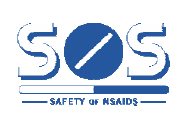
08/07/2009 - Press release
The IMIM Foundation is responsible for coordinating this project, which is financed with 2.8 million Euros from the European Commission

In medical practice, the use of non-steroidal anti-inflammatory drugs to treat pain, inflammations and degenerative joint diseases (for example, arthritis) is wide-spread. However, the use of traditional NSAIDs (for example, ibuprofen, naproxen, diclofenac, etc.) is associated with an increased risk of suffering from moderate and serious gastrointestinal episodes. It is estimated that thousands of gastrointestinal complications occur each year in the European Union, most likely due to its use. A new class of NSAID - the coxibs- have been developed and designed to minimize the risk of gastrointestinal problems but; since its introduction, the use of these new anti-inflammatories have raised concerns as they can increase the risk of cardiovascular episodes including myocardial infarctions and ischemic attacks. Here, the dilemma lies in weighing the risk of gastrointestinal problems in comparison to the risk of cardiovascular episodes. Both risks can vary from one individual to another and among the 30 different types of NSAIDs available in the European Union.
Despite numerous assessment studies, many different questions remain unanswered, a fact that makes it difficult to make an appropriate treatment decision with regards to the individual use of NSAIDs. Individual studies are often too small and do not allow for the observation of any one anti-inflammatory in particular, mainly because each country uses a very small number of NSAIDs. Combining information from the different countries as well as a heterogeneous and increased volume of samples is key to assessing the risk and comparing these different drugs within subgroups like adults and children.
The purpose of the SOS project is to evaluate and compare the risk of cardiovascular and gastrointestinal episodes among NSAID users and as a specific mission, to establish the differences between the various types of non-steroidal anti-inflammatories. This way, decision-making models could be provided to doctors and regulatory authorities as well as to medical agencies to be used as guides for the NSAID selection process in clinical practice and to minimize the damages related to these drugs.
An exhaustive review of published clinical tests and observation studies will be conducted in order to identify methodological issues and knowledge gaps which will be used to design and conduct an observation study in various countries. This study will include information on more than 35 million Europeans, which will be extracted from health databases in the United Kingdom, the Netherlands, Germany and Italy. The data will be used in many ways to acquire knowledge that will be subsequently used to develop decision-making assistance models for clinical practice with regards to the type of NSAID that generates the lowest gastrointestinal and cardiovascular risk for each patient in particular. The decision models for regulatory agencies will focus on the public health risk.
The SOS project (complete title: “The Safety of Non-Steroidal Anti-Inflammatory Drugs”) has been granted 2.8 million Euros in funds from the European Commission under the 7th Framework Programme for Research and Development. Professor Dr. Miriam Sturkenboom, from the Erasmus University Medical Centre (the Netherlands), is the coordinator of the SOS project which will be carried out by a consortium of 11 outstanding research institutions. The IMIM Foundation, through its European Project Coordination Office, will be responsible for administrative coordination.
About the IMIM Foundation
The IMIM Foundation is a private, non-profit entity that was created in 1992. Its objective is research and post-graduate teaching in the field of biomedicine and health and life sciences, and their promotion as part of the Municipal Institute of Health Assistance (IMAS).
Among other responsibilities, the European Project Coordination Office manages and monitors research projects and the grants that are requested. It is currently managing 5 leading international R+D projects. Its objective is to promote quality research, ensure ethics and safeguard deontological principles, disseminate the results of the research work and promote specialized teaching and continuous learning for health science professionals.
The Research Triangle Institute is also participating in the project through its pharmacoepidemiological unit located in Barcelona.
About RTI Health Solutions
It is a non-profit entity that does research and provides pharmaceutical technical assistance to pharmaceutical and healthcare-related companies. Since 2007, it has had an office in Barcelona which is staffed with experts who specialize in pharmacoepidemiology, safety, pharmacovigilance and risk management.
More information
Participating institutions
Servei de Comunicació:
Marta Calsina Freixas(ELIMINAR)
Tel:
(+34) 93 316 06 80
Doctor Aiguader, 88
08226 Barcelona
© Institut Hospital del Mar
d'Investigacions MèdiquesLegal Notice and Privacy Policy | Cookie Policy | Site Index | Accessibility | Find Us | Contact